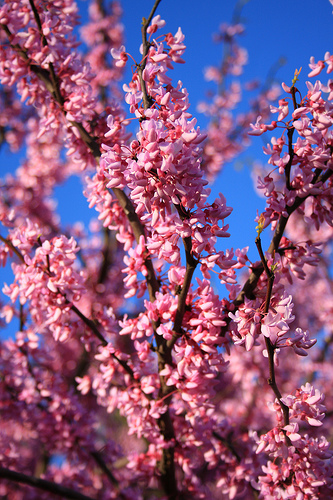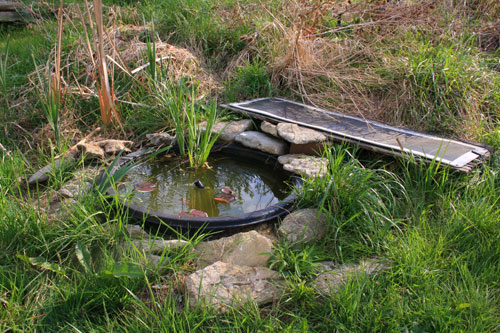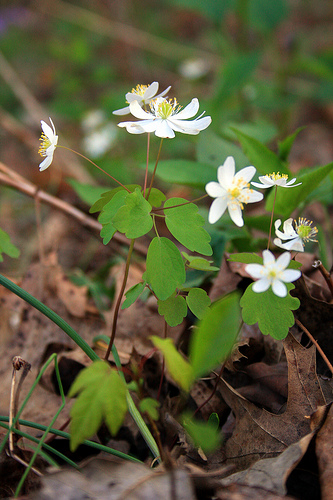|

Daffodils to greet the new month.
Washington Co., KY.
(*photo
credit)
April 1, 2010 Maundy
Thursday, Creation and Service
Holy
(Maundy) Thursday comes from the Latin prayer of washing feet, just as Jesus
performed on this day. He wanted to show how much he wished his disciples to do
humble service for others -- the deepest form of Christian spiritual activity.
He was teaching them what to "lord over another" really ought to mean. They
would be called to exercise power as we will see on Easter Day -- the power of
the risen Lord. However, that power was not worldly lording over others in the
form of subjugation or exploitation. One counter movement to false lording has
been what is termed "Creation Centered Spirituality." The basic impulse is
good, but centering only on creation's glory and wonder is not sufficient;
damaged creation must be renewed and healed. We must not go to the Last Supper,
stay for a short while and perform individual creative acts, and then leave
before the uncomfortable work of foot-washing commences. Glory also comes in
repairing damage done.
The
central issue of "creation spirituality" is glory and wonder, creative
expression, a refusal to control and exert power, and an acceptance of being
part of creation but not above it. The sense of mystery even of the Passover
event is present more like that of an observer, not a participant. To tiptoe
through tulips, observe golden sunsets, and acknowledge all plants and animals
as part of the community of being is needed -- BUT IT IS NOT THE TOTAL MESSAGE.
The Last Supper is filled with a creative liturgy much of which is transposed to
Holy Saturday in our Catholic tradition. However, the key is Jesus' washing
feet, a sign that Christian gratitude is expressed through service to/for
others.
We
followers of Christ are "needy" folks. Our service is a mandate and a challenge
to answer our unique calling in the light of individual talents, circumstances
and opportunities. We need courage to overcome the reticence to give service
for fear of its exposed imperfect performance. In a spirit of creative glory we
know we have been given immense gifts, and now we are moved because these need
sharing through the ultimate human act of love. We do not want to appear
foolish and do nothing when one billion people lack essentials of life. An
appreciation of creation must not result in inaction; rather we are drawn to
share with others the gifts we have received. Gazing at stars or resting at
mountain tops are fine if they are refreshing pauses before needed action. If
they fool us into a quietism and inaction, they are wrong.
We
need to pray, reflect, look and see, give, share, and remove any form of greed
that stifles our spiritual vision. In doing so, we become sensitive to the
needy through the eyes of faith. Necessities can now be distinguished from
luxuries, and we begin to know when we are fooled. Our service becomes our way
to purification and insurance against corruption.
Prayer:
Lord, teach us to see the glory of creation, to show gratitude, to refrain from
damaging gifts given, and to be willing to undertake the service required to
repair a damaged Earth.

Finches at the feeder (American goldfinch, Spinus tristis and
purple finch, Carpodacus purpureus).
(*photo by Sally Ramsdell)
April 2, 2010 Calvary
and the Mystery of Redemption
On
Good Friday we reflect with some difficulty on our human condition.
Suffering and dying are part of the human condition. Before that mortal end that
awaits us, we can enter into or ignore the suffering all around us, or we can
embrace the world of suffering as a reality that we accept and seek to
alleviate. Furthermore, we can make our own sufferings something positive in
offering them to God for the needs of others. Thus suffering can become a
prayerful opportunity. This is in contrast to others who regard suffering as a
catch-22, meaningless, or as an absurdity as articulated by certain
philosophers.
Jesus
suffers and dies for us. Christians, as followers, strive to accept suffering
in reparation for past misdeeds or as preparation for rewards in the next life;
for them, suffering is part of human life, something God gives as a challenge;
for them it means to imitate Mary, John and the holy women standing below the
terror of the cross. The call is to glory in that cross, not in its gory
details, but in its power and glorious ultimate reality. The Christian sees
what Jesus does for us, and also what we can do by standing with him in this
event that transcends space and time. We are present at Calvary; we enter into
the divine mystery of suffering; we can become sensitive to those who suffer;
we grow through patience in an expanding world of compassion.
For
many Christians, Good Fridays invite an individual response focusing on our
imperfect self with many misdeeds; what becomes apparent is the damage we have
done to the entire social structure; we have caused Jesus to suffer at Calvary.
The vivid Passion of Christ, manifested in liturgy and dramatic settings may
lead us to a grander salvation event, a redemption. The creation-centered
approach may serve as a reaction to an individually redemption-centered
spirituality that ignores the wider social dimension of redemption. Individual
devotions in reparation for misdeeds are needed, and are associated with Good
Friday, BUT THEY ARE NOT ENOUGH. Salvation reaches beyond ourselves. Our acts
must have a social dimension.
Many
seek to avoid, run from, deny, ignore, condemn, blame and do a host of other
things to flee from suffering and seek to avoid a thought of death itself. Few
run enthusiastically to personal suffering or death, though the suicidal actions
of terrorists make us aware that some do. Ultimate sacrifice has been visited
upon millions in the thick of battle and on those who give up their lives for
the sake of others. Today we commemorate one who suffered and died for us all --
and Christians cherish the memory of his action on Good Friday. As Christ's
followers we join Jesus in Calvary, so we can celebrate at Easter.
Prayer:
Lord, help us to approach the cross as public witnesses with Mary, John and the
Holy Women. Help us to extend the graces streaming from the cross to our
efforts needed in saving and healing our wounded Earth.

Fresh flowers of the sugar maple, Acer
saccharum.
(*photo
credit)
April 3, 2010
Corporate Creation/Redemption and Haiti
As
we pause after the desolation of Good Friday and prepare for what is to come, we
take a deeper look at a redemption-based approach and find its role in a
meaningful Holy Week retreat. We know that an individual orientation solely to
creation's glory or redemption's agony is insufficient in itself. Merely
concentrating on either creation or redemption apart from the other denies the
total Christian message of life, death and resurrection. A second insufficiency
emerges: celebrating creation is a joint adventure and redemption has a strong
social dimension as well.
Creation-centeredness
diverts attention from activity needed to address the damage done; an
individual redemption-centered approach is limited in not balancing the sense of
past and coming glory. Many of those who seek a redemptive-focused Jesus-and-I
relationship are also shorthanded. Focusing on self may lead to neglect of our
neighbor. Jesus is our model; he thanks God for all gifts given including the
fullness of creation; he suffers for all through his suffering and death on the
cross. He invites us to a similar balance in life through extending his Calvary
and Resurrection event in space and time; his compassion becomes a binding glue
that holds the world's community together.
The
invitation is to help bring balance to our dysfunctional world. The
Economist, January 16th, 2010 (p. 35) speaks of the new faces of hunger; in
rather prosperous New York City the number of people having trouble paying for
food has increased 60% to 3.3 million since 2003. One in five of the city's
children relies on soup kitchens and this is up 48% since 2004. We are struck
that this city is better equipped to handle its needy cases than many others in
a world of dozens of cities now larger than New York -- once one of the world's
largest. More and more people move into urban areas where they cannot sustain
themselves off of the land. Needs can be met where people congregate, but the
congregating now involves millions of people. The invitation to this deeper
spirituality goes to entire peoples and not just to individuals only. What
about the poor Lazarus of the Western Hemisphere, Haiti? This land visited by
hurricanes and floods in the twenty-first century and now this year with a
horrendous earthquake is a focus for our giving to those in need, and we are
learning to live on far less. Haitians become our teachers.
We are being called to see
God's glory in creation and to see the saving opportunity for a needy people who
are part of glory through suffering. The invitation is for corporate gratitude
and mutual compassion. Haiti at our doorstep becomes an opportunity not only
for Haitians to share their misfortunes, but for us to grow in compassion or
suffering with others. Materialists may flee from such scenes, throw pennies
from a distance, and seek to erase the vision of suffering people. By turning
to Calvary we see beyond; we see a glorious horizon in the future.
Prayer, Lord empower
us to change things through compassion.

A rainbow in the forest.
(*photo
credit)
April 4, 2010
Resurrection: A New Centrality
I will give you a new
heart and place a new spirit within you, taking from your bodies stony hearts
and giving you natural hearts.
(Ezekiel 36:26)
At
Easter, the resurrected Christ comes back to life; death continues to stand
before us, but in a deeper sense Christ has conquered death itself. Christ, in
power, becomes our own future promise of eternal life. The scenes of springtime
in our northern hemisphere remind us that a new life is coming in our natural
world -- a life abounding in wildflowers and new life. Creation gives way to a
new and a far more astounding creation in which we have a hand. Furthermore, we
realize that the saving power of Jesus at Calvary continues, and thus is now
extending in space and time through the Liturgy, which is the work of the
people. We are invited to make up all that has still to be undergone by
Christ, for the sake of his body, the Church (Colossians 1:24). The mystery
of incarnation includes both Christ coming into the world and our bearing the
Word to all the world; so the mystery of the resurrection draws us into a
participative creation/redemption mystery. We help in the saving event by
assisting in the new creation now becoming known to all. Christ's merits are
realized.
Water
is blessed at the Easter vigil and is poured over the newly baptized, those who
experience new life in its spiritual fullness. That water becomes the Easter
water that we take and sprinkle on the fields, the plants and animals around
us. The risen Lord's blessing is now in the water of new life, and we are God's
instruments in bringing new life to others. We recognize water's cleansing and
life-giving properties. We seek to extend the Easter event to others, and water
is a special instrument.
The
new fire of the Easter Vigil and the paschal candle are additional
symbols of new life. Darkness is dispelled by light, and each of us helps
enlighten this dark and troubled world. At dawn and during the advancing Easter
daytime, light fills our world and we are overjoyed by the new life that light
helps give. Just as we are bearers of water, so we are bearers of fire that
burns away darkness and enlightens the lives of others. Fire and water remind
us that there is something profoundly physical as well as spiritual about
Easter. We are called to celebrate because we are more than spectators; we
receive new life -- eternal life -- and this gives us the sense of joy, victory,
hope, peace and forgiveness. It is the promise of joining Jesus who is now Lord
in glory. Thus in his suffering death and resurrection Jesus extends life to
us, a future filled with unending joy. This foreshadowing of new life for us is
what Easter is all about. Thus resurrection, not creation alone or redemption
alone, becomes the center of our spirituality.
Prayer:
Lord give us grace to assist in participating in the new creation and in extending
your saving deeds to all the world.

Purple cress, Cardamine douglasii.
Woodford Co., KY.
(*photo
credit)
April 5, 2010
Reclaim Our Land Commons
As
we till the soil, we consider the value of our land. Our American land policy
developed from European, mainly Anglo-Saxon, land ethics (see Reclaiming the
Commons on this website). The notion that this country could have private
holdings staked out from the Native American land commons was regarded as
legitimate, and protected by the might of military power. That staking process
extended in the entire settling of the west, and the land grant and railroad
grants of the nineteenth century -- and is still regarded as the almighty right
to land-holdings of varied sizes.
Throughout
human history certain lands were common hunting territories (native tribes
considering Kentucky as commons) or were reserved for common grazing (English
commons) or other purposes. Today, in this resource-short age, scarcity of
global land for essential food production makes some modifications in land use
and land commons imperative. Some practices include:
*
Redistribution -- The small farmers of the world, especially those
producing grain and oil-crops, should be given land to use. This may mean the
dividing of unproductive estates, hunting preserves, large lawns, and golf
courses;
*
Regulation of use -- Forbid the use of food-producing areas for biofuel
production (now occurring in Malaysia and Indonesia). Better results could be
achieved by use of non-productive space for biofuels or the use of wind and
solar energy sources. Farms must be used for essential grain and oil-bearing
crops and not for animal and specialty crops;
*
Forbidding misuse -- Poor land practices can deplete soil through
erosion, salination or destruction of soil microbes through corporate farming
practices, such as pesticides or overuse of commercial fertilizers. Strip mined
and urbanized polluted lands need to be reclaimed at the expense of the
culprits;
* Zoning
and land conservation measures -- Some regard the title to land as a
privileged entitlement to use as one sees fit. The community needs to have a
voice in how land is used properly; and
*
Edible landscaping -- Encourage the use of lawns and small urban patches
of land for edible landscape in order to help feed local populations. Often
local rules require certain types of lawn grass to the detriment of vegetable,
herb, fruit, and nut crops.
Prayer:
Lord teach us to be humble (derived from the Latin word "humus" for soil). In
this recent season of Lent, we were reminded that we are from dust and will
return. Help us to respect the rich microcosm of soil beneath our feet and to
regard all of this wealth as a commons meant for the benefit of all people.

Lady bird beetle on fresh spicebush
flowers (Lindera benzoin).
(*photo
credit)
April 6, 2010
Give Thanks for April's Blessings
Each
month is a time of thanksgiving -- and it is easier to find examples
for some months than for others. With the sunshine and freshness of
April, our hearts and minds go out to a plentitude of good gifts all
worthy of mention. Without being exhaustive, let us give a few
examples and encourage you to list your own. We are thankful for:
*
Enhanced greenery in grass and in the carpets speckled with yellow
dandelion blooms, which some despise but others delight;
*
Pink to purple redbud and the white to pink dogwood, all ablaze in
glory in woodlands coming alive with spring wildflowers;
*
Gentle spring showers that bring on a plethora of May flowers of all
varieties and colors;
*
Frisky colts and the new-born nestlings and pups, lambs, kids,
kittens, calves, and piglets -- and infants at all seasons;
*
Migratory birds, passing through on the great flyways, many stopping
and resting for a period on their journey, all adding to the color
and sound of our glorious spring;
*
Easter celebrations with the atmosphere of joy, victory and hope,
and the blessing of land and all creatures with Easter Water;
*
Sounds of shrill delight among children who know that winter is past
and the outdoors is a more friendly place for all;
*
Crack of bats as the baseball and softball season opens in the local
parks;
*
Opportunities to take down the window insulation, to do spring
cleaning, and to air out the house on those warmer and breezy days;
* That first
taste of poke greens and other wild salad greens along with some of
the early mushrooms for those who are observant;
* Longer days
and shorter nights so that travel is now much easier in the
evenings;
*
Spring hikes with the sounds, smells and sights of new life
abounding all around us;
* Cheerful
dispositions on the part of winter-haters; and
*
Leafing-out of the trees during the final weeks, which gives a
fullness of greenery to the landscape.
Prayer:
For all of these we give our heartfelt thanks. May eternal life be
an everlasting April.

Water, a precious resource. Mercer
Co., KY.
(*photo
credit)
April 7, 2010
Eight Critical World Health Threats
On
World Health Day, we ought to review some of the major
threats that exist, or will soon emerge to threaten world
populations. It seems so strange that, despite a world of advanced
water and air purification techniques, health and safety prevention
measures and sophisticated medical equipment, threats loom over the
poor in 2010. The World Health Organization strives mightily to
alert the public to new threats, but needless death and injury
persist. Is this world health threat survey complete?
*
Tobacco products -- While the world today suffers the
shortened lives of three to four million per year at current smoking
rates, the number could rise manyfold in two decades.
*
Contaminated drinking water -- After so many years of knowledge
about infectious diseases, how is it that so many still lack the
basic chlorination needed for today's drinking water?
*
Polluted air -- Residents subjected to pollutants in the
outdoor air, especially in rapidly industrializing countries, have
emerging severe asthma and other respiratory problems.
*
Defective cooking stoves -- Over one billion poor people
still cook their meals with wood or charcoal over fires that
require close attention. Women cooks, as well as the elderly and
youth who spend much time indoors in buildings with poor
ventilation, are especially vulnerable. Solar cookers and better
stoves could greatly reduce this threat.
*
Alcohol and drug consumption -- A rising tide of middle
class people with higher paying jobs may only exacerbate the spread
of alcohol/drug consumption among those with more spending money.
The war on drugs seems to never end as cartels continue their
lucrative business and governments fail to halt the flow.
*
Defective home construction -- Deaths were about 230,000 in
Haiti this year and up to 77,000 deaths in China in 2008 in great
part due to poor building construction methods.
*
Traffic accidents -- With the rapid increase in automobiles,
especially in Asia and Latin America, and the urge to drive fast and
furiously on poorly constructed and policed roads, the awful toll on
drivers, riders and pedestrians will most likely rise.
*
Lack of vaccination -- This last seems the most preventable
threat to eliminate in the coming years, but gaps remain in a world
where health funds are strapped and treatments are restricted by
lack of access to proper vaccines. Some parents avoid vaccinations,
but their concerns are regarded as unjustified by health experts.
Prayer:
Lord, give us a deep concern for our brothers and sisters in
other lands, and help us see that redistribution of resources would
help alleviate health threats in our world.

Bark of oakleaf hydrangea (Hydrangea quercifolia).
(*photo
by Sally Ramsdell)
April 8, 2010
Redirect Current Tea Parties
Tea
parties sound benign enough, but the ones thrown throughout the
United States in 2009, and continuing until now, put a bite into the
beverage. These tea party-goers do not sit around holding up their
little fingers and eating crumpets. They are more in the style of
the 1773 Boston raiders who threw the crates of British tea into the
bay. They are angry; they want change; they speak with emotion;
and they have already helped swing elections in New York, Florida
and other places where they show influence.
Many non-tea party-goers sympathize with the deep discontent of this
new movement, but some of us think it is not as well directed as was
the one by our forbearers in the 1770s. Are the discontented
patriots of the twenty-first century, with their easy access to
information, still confused as to the causes and sources of their
discontent? Certainly, discontent arises over a stagnant jobs
picture, persistent plant closings, long-term unemployment, home
foreclosures, high prices of heath insurance (if insured) and higher
education bills. There is much anger over a complacent government
allowing the privileged to take bonuses at what seems to be taxpayer
expense. The discontented see that favors to Wall Street scalawags,
while Main Street is ignored, only fuel resentment of government.
This focus of resentment doubly frustrates would-be tea-party
supporters, because troubles are directed only to a government with
runaway spending, while untouchable corporate spending is totally
overlooked. It is as though Wall Street cannot be touched by
criticism.
The
greatest problem is that the patriots, who deserve to be incensed,
chant a mantra prepared for them by corporate America -- "no new
taxes." Is that what they really want? Do they forget that the
super rich pay the lowest tax rate and they, the little fellows, the
highest? Should it be "Tax them (the rich), not us (the poor &
middle class)," for this would have social as well as economic
dimensions? The equivalent of the eighteenth-century patriot's
nemesis (George the Third) should not be found in national
government but in the globalized banking system. The party- goers
have been so propagandized against big government that they overlook
something that looms bigger and is less controllable -- an existing
military/industrial/corporate complex. This giant is now allowed to
speak at elections with full use of financial resources and can
influence votes through highly controlled media. The tea
party-goers ought to direct attention to a new nobility of the
financially privileged, who can buy influence and governments at
will. If the agitation were well directed, still more citizens
would rally to the cause, and maybe rightly so. Jefferson could be
the patron saint; he hoped that his revolutionary spirit would
survive, grow and show itself in new ways.
Prayer:
Lord, teach us to be social enough to go to tea parties, and
socially-oriented enough to point out why the party should pinpoint
accurately the causes of discontent.

Seeing the forest... for the trees.
(*photo
credit)
April 9, 2010
Big Government Is Bad; Little Government Is Worse
Some
people disparage big government with fears of an emerging
socialistic or communistic or autocratic regime. History can teach
us much about the sorry state of such absolutist governments with
their Stalinist mines and Nazi concentration camps. So much for
oversize. However, not to be overlooked are the examples of failure
of government (failed states, anarchy, or the usurping of government
by private individuals or companies). Greedy, enterprising people
can enter a place and take advantage of lack of regulation to create
mischief by exploiting weaker communities and unguarded natural
resources.
Size
is all important, for too much government restricts freedom and so
does too little; thus a lack of balance in government permits the
rise of private globalized entities that can dictate terms for
employment, livelihood and even the standards of living. Too little
government results from the lack of regulation that checks the greed
of groups or individuals, and greed can become addictive. Unchecked
greed is infectious and leads to greed on the part of more and more
-- and even moves down to poorer folks who strive to enter the
greedy foray.
From
its earliest days the United States has generally been plagued by
too little government, and the overlooking of the power of the
unregulated super-rich. During various periods of time, the wealthy
could take their riches to foreign tax havens, make decisions to
ruin manufacturing centers, and move their businesses to foreign
lands with fewer regulations. The most fearful sight is autocratic
and undemocratic governments making agreements with each other on
the use of sovereign funds and on the enticement of business so as
to bypass regulated and democratic governments. The UN lacks
enforcement powers, and this limits its ability to tackle global
problems. Global government is currently too small.
A
host of problems is now plaguing the world commons: air pollution,
land erosion, lack of food security, limited water rights,
international lack of privacy, transportation and communications
problems, movement of peoples, limited availability of health care
and control of outer space to name only a few (see Reclaiming the
Commons on this website's Special Issues). What is starting to
emerge is the demand for a more powerful United Nations with teeth.
A superpower (e.g., United States or even the European Union) does
not have the power to regulate the globalizing trends of
totalitarian businesses whether public or private.
Concerned
citizens are rapidly moving towards the idea that a more powerful
super-government is necessary to handle the multitude of global
problems that are arising. The 2008-09 financial crisis was a
failure in financial regulation at the global level; we need
regulations that go beyond those of individual nation states.
Prayer:
Lord teach us to explore the changing conditions that require new
systems to bring justice to the world.

A fallen log adrift in Kentucky creek.
(*photo
credit)
April 10, 2010
Striving for a Sense of Mercy
We read about
people in earlier centuries who went to gory executions where
convicts were drawn and quartered (look it up if you are unaware),
or chopped-off heads were spiked at the city gates, or the disabled
were ridiculed by crowds. We regard ourselves as far more merciful,
and in some areas maybe we are. Most people do not like or allow
their loved ones to endure sights of aborted fetuses and dying
accident victims or battle sites.
However, before we
pat ourselves on the back, let's look a little deeper and consider
where merciless actions still exist:
*
Redistribution of resources -- Three million die of hunger each year
while in the lap of luxury some throw away half of their food
supply;
*
Capital punishment -- Among civilized nations only the United States
and a few other permit the death penalty;
*
Corporate decisions -- Plant closures can deny livelihoods and
disruptions to entire communities;
*
Merciless profits -- Some few make fortunes while their workers
barely make ends meet;
*
Lack of immigration reform -- Twelve million are preyed upon because
of lack of proper status;
*
Massive unemployment -- The irresponsibility on the part of
governments, which should create jobs by using the bonuses of the
undertaxed privileged ones in society;
*
Jailing for lack of bonds -- One half million poor Americans fit
into this category; and
*
Merciless spectator conduct -- booing of the defeated or the
referees with little sign of appreciation for competing groups.
Some
of these examples may be regarded as "tough love" or deserving
action by readers; other examples may be forthcoming as well. A
few may champion issues that others may object to on ethical
grounds, such as allowing "mercy killing" of a deformed newborn or
"putting away" an elderly human being in the manner of a sick
animal. Mercy comes with different interpretations, and what is
merciful action to those who would terminate human life is
transformed into works of mercy by those who care for the helpless,
disadvantaged or infirm. Much of this interpretation of mercy rests
on the component of gratitude for gifts given and the universal love
we have for our brothers and sisters (see tomorrow).
Prayer:
Lord, give us a deeper sense of mercy that seems to grow upon us as
we become thankful for the gifts given to us as individuals and as
the People of God.

Discovering a wild game trail in the
forest.
(*photo
credit)
April 11, 2010
Consider Divine Mercy and Earthhealing
This
is the day the Lord has made, let us rejoice and be glad.
(Psalm 118)
Within
the last decade, the Sunday after Easter has been called Divine
Mercy Sunday. For years I did not understand its placement when
we were celebrating Easter's joy, triumph and faith. However, with
time the merciful aspect has become more evident -- and the
merciless aspects of our social and economic system have added to
the understanding. We are to renew our Earth and this must be done
in an atmosphere of mercy. Easter mercy and joy extend beyond a
single Sunday, and are celebrated on every week's First Day. They
also need to be part of our everyday activities.
God's mercy
comes to us in the suffering, death and rising of Jesus Christ, who
is now Lord in power (Romans 1:4). Through a seemingly powerless
condition, Jesus rises as triumphant Lord. At the moment of utter
powerlessness, suddenly the power of God is manifested. Nor is it
contained in an event of two thousand years ago; the event now
includes us who are part of the divine family of God through the
fullness of baptism/confirmation. Here and now we discover the
mercy of God at work in what lies ahead of us.
The
gift of trusting in the Lord extends to those who believe in this
Easter event. We are made whole enough and empowered to help heal
our wounded Earth. Can we bring about new life, or is the planet
doomed to deterioration, to melted ice caps and flooded coastal
areas, to hurricanes of immense magnitude and extremes of heat and
drought? However, power comes in becoming present to the
Calvary/Resurrection events, and thus we see the mystery of our
participation in the divine plan. Furthermore, this incorporation
is a sign of God's mercy, not divine vengeance. We are called to
address our misdeeds and to make reparation -- and this reparation
involves healing. In loving gratitude we become merciful.
We
Easter people make a choice between life and death. Those without a
sense of Resurrection fall into the death trap -- abortion, "mercy"
killing, death penalty and military engagement. They see no hope,
and resort to becoming increasingly self-centered; they deny facts,
excuse themselves from work, and escape to material enticements. On
the other hand, Easter people affirm divine mercy and life itself
through merciful deeds. Easter people are empowered in the
resurrected Lord; we recognize Calvary's powerlessness, and
Easter's power that can confront the materialistic despair all
about.
Through
new life, our wounded Earth can be renewed; we can now unite, work
together, and help establish peace; we see that renewable energy
and resource conservation are healing deeds.
Prayer:
Lord, in your mercy, counter our unbelief. Help us see that we can
better our world, and that we are rejuvenated in the Risen Lord
through your mercy that extends through the world.

Glacier near Hyder, Alaska.
(*photo
credit)
April 12, 2010
Global Warming Coming Sooner and Faster
Many
of our reflection headings this year begin with an active verb,
indicating that we ought to do certain things. If one is needed
today on Global Warming Day, it is to defend the findings of
98 percent of scientists in saying our planet is warming, and that
this is due in great part to human efforts. We are called to act as
individuals and communities in curbing resource use and to persuade
those in public office to make this a matter of top priority. This
is especially true with the recent disappointment of the Copenhagen
meeting and its lack of definite final accord.
Climate
change matters are worse than predicted a decade ago, and the alarm
continues to rise. Emerging middle class people in China, India and
other economically advancing nations are determined to imitate the
West's materialism. The supposed goal of only a +2C (degrees)
global temperature rise will have drastic effects, but a more likely
(at present expanding consumption patterns) greater rise would cause
massive chaos on our planet. David Miliband, the UK secretary of
state, says, "We cannot cope with a +4C degrees world." In a world
map published a few months ago by the British government the +4C
would not be evenly distributed, because many ocean areas would have
lower temperatures and the North Pole regions would rise as high as
+16C. Sober and shocking effects of such rises were enumerated on
the map:
*
60% likelihood of irreversible decline in the Greenland ice sheet
resulting in a 7 meter (over 23 feet) global sea-level rise;
* reduction
of permafrost in Canada and Alaska and almost complete disappearance
in Asia (thus resulting in methane release, which will exacerbate
climate change);
*
Maize and wheat yields reduced by up to 40% at low latitudes in
North America, South America, and Africa and a decrease of rice
yield by up to 30% in China and India;
*
Marine ecosystems could be altered by ocean acidification with
significant impact on fisheries;
* Drought
events twice as frequent across the Mediterranean basin and parts of
Africa and Indonesia;
*
Sea-level rise and storm surge likely threatening Netherlands and
southeastern England;
*
Half of all Himalayan glaciers significantly reduced by 2050
(amounts are disputed). The Indus river basin obtains 70% of its
summer flow from glacier melt; and
* The hottest day of the year in Europe up to +8C degrees.
Many
other troubles are expected as well due to flooding (500 million
affected) and two billion without access to fresh water. In
order to avoid the most catastrophic impacts of climate change, we
must press our governments to cut emissions and help vulnerable
nations to adapt. Full report: <www.unep.org/compendium2009>
Reference -- Acid
News, No. 4 December, 2009 pp. 12-13.
Prayer:
Lord, we are to observe the signs of our times; Help us to know and
to persuade other to act now.

Northern cardinal (Cardinalis cardinalis) complemented by fresh blooms of the quince.
(* photo by Sally Ramsdell)
April 13, 2010 Greed Can Ruin
Democracy
On
Thomas Jefferson's birthday we ought to celebrate by going
past the third president's foibles and faults that investigative
critics have been quick to point out. Rather, we ought to dedicate
ourselves to reaffirming the democracy that Jefferson so loved; we
need to expose today's threats to our freedoms just as he exposed
the weaknesses of George the Third when writing the Declaration of
Independence. The greed of banking and financial interests today
would make Jefferson cringe. He would soon discover that what he
disliked about the excessive powers of the British crown has now
become commonplace in a world lacking global government
enforcement. He knew that democracy is a fragile plant that needs
constant cultivation and growth much like any agricultural crop.
Without constant watchfulness our democratic process can be stifled
and we could lose our precious heritage of freedoms.
Today,
our American way of life is under attack by a global capitalism that
allows communities to be vulnerable to decisions made in boardrooms
thousands of miles away. Furthermore, nothing is more vulnerable
than this democracy where the power of lobby groups overwhelms
legislative process and defenders of democracy (including my friend
Ralph Nader) are blackballed by media controlled by corporations.
With new areas of corporate finance directed to election
campaigning, people are even more vulnerable to disparagement by the
media.
The
bigness of the corporate world (something Thomas Jefferson
never imagined) leads to political power, and this leads to
access in Washington to the halls of Congress and the White
House, and this leads to influence that perpetuates the
bigness. The entire process of coming to influence is motivated by
greed and profits and leads to further erosion of democratic process
and citizen monitoring. Greed is never satisfied, but leads to ever
higher levels of want. Greed is addictive to the individual and
infectious to a society that finally concedes that one can function
successfully only by having more power. For the greedy, basic needs
and an orderly control of distribution of resources are overlooked.
Greed breeds ever deeper greed and becomes self-perpetuating.
A society that minimizes private or individual control measures
(fasting, abstinence, sharing, etc.) will overlook the needs of
others. Powerful greed in the hands of a few can infringe on the
rights of the weaker members of society, and thus usurp the right of
all to adequate resources in our world. Proper governance takes a
back seat to the power of the emerging financial nobility. When
corporations have a global reach and no global restrictions, the
power to evade regulation grows with a pact of the greedy and
autocratic states. Democratic governments become unpopular and maps
of "freedom's fate" appear. Will we be a Jefferson?
Prayer:
Lord, teach us to recognize greed, and to expose, denounce and
neutralize it from the contamination it can cause.

Violets emerge early in Kentucky spring.
(* photo by Sally Ramsdell)
April 14, 2010 Pan
American Day and Immigration Reform
What
have you done to your brother? (Genesis 4:9)
On
Pan American Day we consider our Latin American brothers and
sisters, both those resident in foreign lands, and those who have
migrated to our shores. The latter are regarded as second class
citizens, not entitled to the benefits of our nation -- but this is
not socially just. The oversight is all the more egregious, because
these "illegal" migrants are often saddled with low-paying menial
jobs on farms and gardens, in home care and in cleaning and other
serving occupations. Without these hard-working folks, our
country's operations would grind to a halt. Without proper
safeguards, these people work under great uncertainty, and they
suffer much at the hands of those who profit from their
vulnerability. In essence we repeat what was said three years ago
(April 22, 2007) on this subject:
Our
nation is a nation of immigrants. Our ancestors came from many
lands. Over the decades, such a diversity of peoples has enriched
our culture, economy, and religious experience. Widespread
migration and controversies about it remain a part of our national
experience. We as church must speak to this sign of the times from
the perspective of gospel values and as Christian witness.
Our
basic principles are clear: We respect the right of nations to
enforce their borders and to enforce reasonable immigration laws.
At the same time, we regard every person, illegal immigrant, legal
immigrant, or citizen, with the mind of Christ as a human person
worthy of dignity and respect.
Taken from "Every
Man and Woman Is the Image of God,"
Catholic Conference of Kentucky, August 25, 2006
Any
new immigration legislation should have the following elements:
*
Family-based immigration reform that reduces backlogs and waiting
times for family reunification;
*
The restoration of due process protection for immigrants taken away
by the 1996 Illegal Immigration Reform and Immigrant Responsibility
Act (IIRIRA);
*
An earned legalization program for the undocumented population that
is workable and that includes a path to citizenship which is fair
and achievable;
*
A future worker program that permits migrant workers to enter safely
and legally and that includes worker protection and the option for
participants to pursue a path of citizenship; and
*
Policies that address the root cause of migration, including
economic development in originating countries.
Prayer:
Lord, inspire us to press for immigration reform that is just to all
parties, for it is long overdue.

Redbuds (Cercis canadensis) create quite a display against blue sky.
(*photo
credit)
April 15, 2010
The Right to Work and Downsizing Expectations
Workers
are available. Taxes are due today, and civic duties come to
mind. One thing becomes ever clearer: every citizen has a right to
make a meaningful life, and this involves meaningful work. Some
find ways on their own, and others need people to assist them in
discovering and adjusting to the particular civic tasks to which
they are suited. In working, all citizens deserve compensation for
themselves and for their dependent family members. Government must
guarantee this right to work when it cannot be found elsewhere.
Jobs
are available. On Leonardo de Vinci's Birthday (born
1452) we should realize that creativity extends to many of the
artistic and practical areas in which he was interested. Creativity
in work opportunities is desperately needed today. An
under-secretary of creative jobs should seek out positions for
meaningful work that people will like; examples of such
opportunities may include:
* Ten million
domestic caregivers now going uncompensated;
* Two to three
million in renewable energy programs who are now being compensated
through stimulus funds;
* One-half million
small food producers who could be compensated through funds now
going to large agricultural enterprises;
* At least five
million who could become part of a new conservation corps, and
assist in infra-structure revitalization (water systems, roads, tree
planting and maintenance, and recreational facilities); and
* A million
waiting for new construction jobs at schools.
Private
capital is unavailable. If jobs are sought and needed work
possibilities actually exist, the specter of rising and persistent
unemployment stares our national leaders and all citizens in the
face. High health insurance costs and the private sector's
inability to create jobs weigh heavily upon us. To make this basic
right to work operative requires a radical readjustment of the
economic system, a redistribution of wealth. Government is the
employer of last resort; Works Progress Administration (WPA)
project products from Great Depression days endure today.
Unemployment
runs around ten percent in this country, and even higher in certain
European nations, and swells to over half the population in poorer
African nations. Some estimate Haitian unemployment at
three-quarters, though sizeable numbers could now be employed in
rebuilding that earthquake-ravaged nation. In Appalachia, higher
paid low-skilled manufacturing jobs have vanished through automation
and shifting markets. After World War II, West Virginia had 125,000
coal miners; the state now has less than one-fifth that number.
Hopelessness enters communities with long-term unemployed workers,
leading to domestic discord and substance abuse. Work is a key to
community cohesion.
Prayer:
Lord, help us to see that deep-seated social unrest results when
people do not have an opportunity to make a living.

Seeds of the thimbleweed (Anemone virginiana),
soon to be dispersed for late summer blooming.
(*photo
credit)
April 16, 2010 Compensate
Domestic Caregivers
Many nights I
am up with him (a husband with Alzheimer's disease) at least
two or three times a night. (54-year-old wife)
During
this year some efforts have been undertaken by the Obama
Administration to allow for greater support of and compensation for
the (maybe as high as ten) millions of mostly overworked adult women
who care for elderly parents and relatives and those of all ages
with special needs. These people often sacrifice much of their
adult lives and give immense attention to real needs on the part of
unfortunate individuals who are not institutionalized at a major
expense to the taxpayer -- and who live under the loving care of
those most concerned about them. Much is saved through voluntary
service by these heroic caregivers, and often with little word
spoken in their defense. Furthermore, compensation to domestic
caregivers would have a number of hidden benefits:
* Just
compensation would remove from the job market millions of heroic
souls, who strive to hold down generally lower-paying jobs while
rushing home to care for their aging parents and other dependents.
Give the outside jobs to those with less responsibility and leave
the domestic tasks to those who care most;
*
Just compensation would reduce the high cost of institutionalizing
many who need assisted living or total care. Most often, the
compensated domestic caregiver can do the task at far lower cost and
with greater love and concern. Often total care comes to $50,000 to
$60,000 a year, far more than domestic compensation. Research finds
that adult day services for dementia victims improves the health and
reduces the stress of all parties;
* Just
compensation would be good use of government money, better than much
of the military expenditures. Perhaps, our nation of tolerated
bonuses to undertaxed multi-millionaires should think twice and tax
the rich. Through revenue gained from taxing the wealthy fairly,
social services could be expanded to pay for domestic associates,
home health nurses and physical therapists who assist domestic
caregivers by helping upgrade their services;
*
A just and fair tax on the wealthy would help redistribute income.
It would afford funds to pay for caregiving jobs. Such a program
could eventually be global in scope and give employment to three
hundred million domestic caregivers; and
* Taking
responsibility for those who cannot care for themselves satisfies
the demands of the common good. Those who sacrifice for those in
need deserve a just compensation as part of the benefits to all in
the commons.
Prayer:
Lord, help us to find meaningful jobs for the un- or under-employed,
and to compensate domestic caregivers who play a vital role in
giving love and concern to loved ones who need care.

A row of vibrant tulips along a garden's edge.
(*photo
credit)
April 17, 2010 Tips
for Garden Week
Gardening
is on our minds now and really throughout the year. Sometimes we
stand back and look at more general tips for the successful
gardener:
*
Perform seasonal garden planning and not just once a year
planning. For example: winter planning for deciding what to grow
and obtaining seeds; spring -- for adjustments in plans; summer --
in preparing fall garden; and autumn -- for protecting crops.
*
Decide on summer varieties now, that is the types of tomatoes
and the variety of herbs and greens both for spring and fall. The
greater the variety, the better the chances that some will do very
well, and the less the chance that there will be an over-production
of certain produce.
*
Control weeds through a combination of methods. Some
purchase and maintain a tiller for larger scale gardens; others
like a sturdy hoe (avoid the commercial cheap ones found at bargain
stores) that may be obtained at flea markets or old fashioned
hardware stores; still others use mulch on the walkways or in the
beds themselves, though some mulch can drain nutrients because of
natural decomposition, as much as supply nutrients.
* Inspect
frequently for pests. Feasting insects can be nipped early by
manual removal before they proliferate. Consider growing companion
plants, which are preferred for consumption by common pests such as
Japanese beetles.
*
Secure a good water source, for this may prove to be a dry
year. All too often people rely on municipal water to tide the more
vulnerable veggies through stressful times; chlorinated water is
hard on produce. Remember that better mulching can be especially
helpful during dry times.
*
Watch the garden's progress, and give the task to others in
those summer spells when you will be away. Do not allow the garden
to be neglected, for it deserves tender, loving care.
*
Think autumn variety of produce that can last through much of
the winter. It is always time to talk about temporary or permanent
cold frames that can tide one through part of the winter.
*
Talk to local gardeners across the fence or at civic
functions, while at the store or after church. Many have
suggestions for new methods, the weather, seed availability and new
literature, which you may want to acquire.
Prayer:
Lord, give us inspiration to sit for a moment and reflect on the
actions to be undertaken, not only today but throughout a longer
period -- and to see this as part of our prayer life.

A well-known fishing spot in Anderson Co., KY.
(*photo
credit)
April 18, 2010 Fishing
in Today's World
St. John's
Gospel, Chapter 21, tells us much about the resurrected Lord and how
he wants us to cooperate in spreading the word. We are to be
partners with the Lord, as illustrated by a story about people
fishing. Peter begins the scenario by saying he is going fishing,
and others agree to follow along. However, Jesus is not present;
they toil in vain; then Jesus appears on the shore and directs them
to cast nets elsewhere. They follow his direction and catch an
enormous load of fish -- maybe one for every land in the world. Or
is this another of the signs that are found in the Gospel of John?
Is 153 fish a mere extraordinary number (the sum the cube of the
integers --1 cubed + 5 cubed plus 3 cubed)? Or does it tell a
message that Christ gives plentitude?
Peter
puts on his garments and jumps into the water -- really, one of
Scripture's humorous passages! He goes to Jesus on the shore and
finds that he has lit a fire for their breakfast and asks for part
of the catch so they can eat together. The invitation is always out
for each of us to take our troubles to Jesus, and then find solace
in his presence and care for each of us. The Lordship of Jesus is
not one of distance and aloofness but one of immersion and concern.
Our own efforts may prove seemingly fruitless, but if we have a
sense of listening, we will recognize that the Lord directs us to be
ever more fruitful. "None dared ask him who he was." The Gospel of
John is a story of all coming to know who he really is.
This
chapter concludes with Jesus asking Peter to repeat his vocational
call. Jesus asks Peter if he loves him, and really loves him (Jesus
uses a more intense word for love the third time he says it). We
must realize that our past must be put behind us so we can live a
new life in Christ, and that this is of utmost importance to
complete our ever expanding mission. Each must learn that just as
the Church grows in age and wisdom, so each of us must mature until
the day we die. Jesus asks Peter to follow him all the way to the
end, even when others will take over his freedom of movement, and
lead him where he does not want to go. There and then, the fullness
of following the risen Lord is realized.
In some ways
this last part of St. John's Gospel stands alone, and in other ways
it is the whole of our relationship with the risen Lord. Christ is
in our midst loving, working and encouraging us to continue in our
journey of faith. Many of us have that summer call of life to take
on new possibilities as we grow and overcome the weaknesses that
crop up in mid-life. Let us move one step farther, and see that
the Lord is calling our faith community to grow in age and wisdom as
well. Christ is with us and yet we must perform our action as part
of the body of Christ, one that grows with age and wisdom.
Prayer:
Risen Lord, you call all of us to give up the self-seeking found in
trying to do all things by ourselves, and to find you in partnership
in the work we are undertaking.

Fowler's toad, Bufo fowleri.
(*photo
credit)
April 19, 2010
Participate in National Volunteer and Wildlife Week
Spring cleaning
hovers over us as a ritual that comes with the season. This week
when the dogwood and redbud are in their glory, we appreciate
opportunities to put on our volunteer clothes and focus on the
landscape. No beautiful landscape nor animal habitat should be
damaged by human misdeeds, and when they are, we must help bring
about a more pristine state.
*
Trash pickup at roadsides and near rivers and lakes is needed. I
find this task somewhat trying, since each throwaway is the sign of
thoughtlessness on the part of someone who expects another to come
behind and pick up his or her trash. Through poor policing, few
have to pay the $500 fine so frequently posted throughout our
Commonwealth. The state would have no financial woes if it received
a fine for every article of trash. We still need a bottle deposit
bill after many decades trying.
*
Bird sanctuaries are quite possible without the purchase of land.
Many landholders would like to see their woodlands and other places
designated as such sanctuaries, but have never gotten around to
making and installing the signage. Google for where to buy signs.
With effort sanctuary areas can be expanded.
*
Trail maintenance requires only a dedicated lower-skill work
provided supervisory personnel are present. If new construction is
anticipated, a higher-skill level is called for. Trails should not
be opened to and allowed to continue in highly sensitive and fragile
areas, especially if adequate policing is not possible.
*
Tree planting is a good way to involve youth in voluntary efforts,
and the product will have years of future growth and benefits. Nut
or fruit trees offer food for humans and also wildlife.
*
Nature study programs should be emphasized. All young people should
have opportunities to visit and observe areas of natural beauty,
with formal educational programs pertaining to native flora and
fauna, so that all can come to appreciate the immense natural beauty
all around them. Essays, paintings, and projects dealing with such
beauty should be encouraged.
*
Removal of invasive species such as kudzu, wild garlic mustard or
bush honeysuckle takes much time and effort. In the estimation of
some, invasive species are an often overlooked major environmental
threat. In removal operations, those who suffer from poison ivy
must be protected and dissuaded from working in infested areas.
Prayer:
Lord show us the many ways in which we can render a helping hand to
enhance wildlife habitat and add to the beauty of our landscape.
Help us enlist and involve others in the process.

Pond with solar-powered pump.
(*photo
credit)
April 20,
2010 Assign Energy Use Properly
In
calculating energy consumption, does the caregiver who makes the
house call have the fuel use assigned to him or her, or to the
patient? This sounds a little puzzling and it is. As we approach
Earth Day, we hear a litany of statistics about resource use, and
some are scary. One of these is that the United States with 4.6% of
the world's population (2004) produces 15.9% of the world's energy
and consumes 22.5%. It all seems so straight-
forward, though the
first two stats are more easily obtained; people are counted and
barrels of oil recorded. Both have indefinite aspects, for the
degree of precision of world population totals depends on indefinite
population counts of both small and large populations. If one nation
has a hundred million people plus or minus ten million, the total
count is only precise to that degree. Furthermore not every wood
twig is counted as energy when burned. Amid indefiniteness, the
first two stats are fairly well known. What about assigning
consumption of energy?
In
January, the hospital ship Comfort went down to Haitian
waters to treat the many earthquake victims from Port-au-Prince and
its surroundings. The ship used fuel to reach this destination, as
did the many medical personnel to reach the ship. Helicopters used
to ferry victims to the ship consumed fuel. To what extent does one
assign ship or helicopter fuel to caregivers, pilots, or patients?
Is it assigned to the source nation, the United States, or to Haiti
which benefits? Or to individuals in that nation that are
assisted? What about energy resources used to educate the medical
personnel -- really an immense accumulated total? What about
assigning making and testing medicines or hospital equipment or
material? Assigning is difficult.
Are
energy production stats fairly precise, but energy use statistics so
complex as to be nearly meaningless? Not so, for we know the energy
is being used for and by someone or some group. However, assigning
benefits is difficult. Energy profits in money terms could be
assigned; the amounts of energy can be measured properly. However,
the assignment of energy use within a society may be as hard as
assigning blame for some misdeed done. To assign energy consumed to
a materials' exporting country, and fail to mention the importing
one where the materials are used or consumed, makes the assignment
imprecise. A hermit cooks for himself and, as retreat provider,
cooks for others. However few are hermits and many share energy
benefits with many. Even hermits share in the heavy use of energy
by the military. The more resources shared, the more complex the
calculation. In this century the world population is to grow 50%
from six to nine billion people, but worldwide energy consumption is
to grow over 300% from about 400 to 1,400 QBtu (one "q" or Quad = 1015
Btu (U.S. Dept. of Energy estimates). How is all of this energy to
be assigned?
Prayer:
Lord, help us to interpret what we do and how each action is
social and affects the lives of others.

Heal-all, Prunella vulgaris, and stone
(*photo by Sally Ramsdell)
April 21,
2010 Earth Day at the Fortieth Anniversary
In
1970 I was sitting on the lawn before the famous tower of the
University of Texas at Austin. The crowd was listening to a series
of speakers telling about air and water pollution problems, and why
the activism that was then popular in civil rights and anti-Vietnam
War areas ought to extend to the environment. The mode was one of
jubilation as though, if the student power were refocused on this
environmental issue that Rachel Carson and others were raising, we
could soon have a much cleaner world. The fellow sitting in front
of me in the grass clapped enthusiastically, as he smashed his
filtered cigarette butt in the lawn grass. In one moment I knew
this was a bigger issue than cheers and handclaps -- and resolved to
get involved.
We must focus
far more resources on healing, enhancing, preserving, and protecting
our fragile and precious planet. It has been a long time since the
heady days of that first Earth Day in 1970, when the issues seemed
so easily solvable and the solutions so easy to implement.
Certainly many pollution problems have been attacked (air, water,
lead and mercury pollution), and some solved, but "climate change"
was not discussed. Unfortunately, the urgency of the general issue
has not diminished, but has grown, as we see the problems with ever
clearer vision today. "Times, they are achangin'." We are now
confronted with new problems -- terrorism, financial crises, melting
glaciers, and rising oceans.
However,
non-technical problems related to eco-solutions are emerging. A
number of influential environmental groups are too cozy with moneyed
interests, and have lost their initial sheen by arguing for soft
approaches to environmental problems (new nuclear power plants and
biofuels from limited corn supplies). Furthermore, the existing
economic/political system is too outdated to cope with the global
environmental crises. This system is too limited, too filled with
greed, and too narrow in interest to be able to tackle global
problems of such magnitude. On top of this, vast numbers of people
are destitute, while the wealth divide widens, and regulatory
agencies seem paralyzed by the power of the privileged.
Popular
hope for easy solutions started at Copenhagen is waning, as the
world realizes the Chinese and Indian emerging middle class (one
billion new members in less than two decades) want their equal part
of the resource pie possessed so long by Americans and Europeans.
Now is the time for action, and yet who is to stop the new greed
with an ever widening carbon footprint -- even if it could be
stopped? Justice-related answers are difficult and challenging.
These demand regulated controls on resource use, something that must
be imposed by governments. Not only do individuals need to become
better conservationists, but also we need controls at all levels of
society -- along with a United Nations with enforcement powers.
Prayer:
Lord, give us the energy to do what has to be done in the years to
come and to do this in a realistic manner.

Flowers of the Ohio buckeye, Aesculus glabra.
(*photo
credit)
April 22, 2010
Accept, Not Assign, Blame on Earth Day
Everything
we do has a social impact or as Barry Commoner's First Law of
Ecology states, "Everything is connected to everything else." When
we do something good, the entire world benefits; when we mess up,
that extends beyond our immediate environment; each time we toss
away an empty bottle we make a ripple effect on the commons of our
world. This applies to good and bad deeds, to acts of love and to
misdeeds as well. It also applies to some degree each time we
consume a resource whether out of need or out of thoughtlessness.
If we feel guilty each time we make a cup of coffee we become
paralyzed -- and this benefits no one.
On
this Earth Day we realize our responsibility in our use and
misuse of resources, how we are not blameless as past users, how we
find it difficult to assign energy use and misuse to particular
people (April 21st), and how we need to accept and not assign blame
for past misdeeds. To heat our coffee we use a microwave connected
to a grid that has electricity generated by a coal-fired powerplant.
This powerplant produces emissions that add to the pollution load of
the world to some little degree. However, we often regard the
smallness of the degree and not the cumulative act itself. Resource
use has a social dimension, and we all bear responsibility to see
that resource use is for the benefit of all.
Christians
speak about how our sins have crucified Christ -- and some see this
reality with greater force than others. We were never just
bystanders but participants in that event, though in God's mercy we
see that now we can stand up for the suffering Christ in love and
compassion; we have helped to intensify the Calvary event; we are
invited to help in renewing this wounded world. When Haitians
accept their sufferings, and we enter in to alleviate them through
compassionate action, we accept blame unto ourselves as part of a
global sacrifice. The redemptive act of Calvary applies to our
wounded Earth, and we can help in extending the salvation won for us
to this planet.
Blame is not easily divvied up among individuals, for all resources
are used for better (benefits) or worse (through greed and
selfishness). The greedy effects of the past do not evaporate;
they contribute to the total debit of our social capital. In turn,
the concept of partial remission of sin means that the social debit
can be assumed by actions in which we participate here and now as
members of the Body of Christ. The more we engage in ecological
actions for the benefit of others the better; the more we repair
damage done by past misdeeds, the better we help heal our wounded
Earth. Traditional spirituality often focused on individual sinners
and their own personal misdeeds; right as far as it goes. We have
another greater task; we need to accept blame even when assigned to
others -- to a polluting industry and to the consumers of the
product. Let's accept blame and be on with healing.
Prayer:
Lord, make us healers who realize that blame is better accepted than
assigned.

Spring scene along Kentucky creek.
(*photo
credit)
April 23, 2010
Go Only to Green Conferences
Some
regard their importance as measured by the number of conferences
invited to or attended. Since a large carbon footprint comes with
expending fuel for auto or air trips, many people have second
thoughts when the meeting is beyond a subway or railroad ride. The
options for green participation go down as the conference-goers must
come from out-of-the-way places. All in all, a number of
considerations are in order:
*
The necessity of the conference. Many can complete their
business by use of letter, telephone, internet conferencing and
other forms of communication. Often conference organizers have
built-in expectations in which the attendees are a major component
-- and a synergy can be generated through personal meetings, etc.
On the other hand, the conference can be make-work for those who
seek ways to spend their time. They need to be more creative.
*
The presence of everyone. Quite often people come who are
meant to form a critical mass of warm bodies, but could just as
easily be at a distance or have one representative present who
reports back to the rest of his or her community. A car-pooled
group would reduce travel costs somewhat, but many coming from one
place can also be a waste of time and resources. Money and fuel
would be saved if one or two would only report back properly.
* The
frequency of the meeting. Greener consciousness may mean that
there can be cuts in the number of times a group meets, that is,
monthly to quarterly, quarterly to annually, annually to every five
years, etc. The farther the distance and the more scattered the
conference-goers, the less frequent the event ought to be. Another
approach is to meet together infrequently and intersperse these
meetings with conference calls and Internet meetings.
*
The centrality of the location to minimize travel costs.
*
The structure of the meeting. So often meetings are held
with canned speeches by people who are notable, but maybe not
necessarily creative in what they have to say. Large numbers come
and sit in an audience in a rather passive manner, and then take
coffee breaks and talk with partners or other acquaintances for a
period and return to more listening. Couldn't the prepared papers
be distributed to interested parties in order to save all travel?
*
The substitutes for conferencing. We need no longer sit in
large audiences like medieval students who could not afford books or
even writing materials. Today, so many other methods exist for
achieving the same results besides going to a conference and
dutifully taking notes. Let's grow up!
Prayer:
Lord, teach us to weigh options before we decide to travel great
distances. Help us see that "greener thinking" may entail less
travel.

False rue anemone, Enemion biternatum.
(*photo
credit)
April 24,
2010 Increase Physical Exercising
In
preparing for National TV Turnoff Week, let us consider
attitudes that hinder physical exercise, whether when traveling away
from home or home-bound during inclement weather. Some enjoy
exercising and some are embarrassed or dread the bother. Some
students hate school-mandated exercise; some elders may not find a
suitable exercise or place or time; workers may say they have had
enough exercise at work. Surprisingly, many excuse themselves from
exercise. Here are some hints to bolster resolve:
*
Show an interest in that family members and friends do some
exercise. When someone is noted as omitting exercise, an effort
should be made to encourage a type that fits into that person's
temperament, finances, time, and body condition. Our encouragement
should include offering options that the individual has never
considered (e.g., stretching in place for the elderly or individual
exercises for those who do not want to compete with a friend who is
far ahead in a particular activity such as golfing or jogging).
*
Insist that youth exercise. Some are driven to the school or school
bus door and do so little walking that obesity can become a problem
-- exercise becomes all the harder. Often biking or use of a rowing
machine for body building can have an appeal to some who would
otherwise be couch potatoes to the detriment of health. Those who
hate competitive sports should be offered alternatives.
*
For the elderly who cannot walk or stand, exercises in place (while
sitting) can be used to exercise every muscle in the body -- and
these methods should be taught with patience. The elderly may shy
away from exercise, and so they need encouragement; such practices
improve physical health, mental outlook and psychological balance.
Some physical exercise advocates say they can tell how much an
individual exercises by his or her outlook on life.
*
Workers, who stand at a check-out post or who work at a computer
desk all day, should vary their position. Sitters should have
opportunities to stand; those who stand ought to be allowed to walk
about; those engaged in light exercise ought to exercise more
strenuously. Variety in activity is a key to better health. Travel
times are the most challenging, but even here lay-over periods can
be slated for exercise.
A
few suggestions to increase exercise: set aside a specific time;
record each day's time exercising or the number of rowing strokes,
or other measures or carry a meter to determine distance; do not
substitute attendance at spectator sports for your own exercises;
you may identify with active athletes but you are NOT exercising.
Strive to find successful exercising folks who are patient and
willing to teach you a new activity.
Prayer:
Lord, inspire us to move about and to become enlivened as was
David when the spirit moved him to dance about.

Blooming fragrant vines of the wisteria.
(*photo
credit)
April 25,
2010 Observe Vocation Sunday
My sheep hear
my voice. I know them and they follow me.
(John 10:27)
Each
of us is called by God. For Christians the call is to follow the
Lord, but what does this mean -- being dutiful sheep before an
all-powerful leader? Thus to answer our call we need to see that
through baptism we are to be other christs to the needy of the
world. In following, we are called to be leaders.
Shepherds
may have different characters as do all leaders. Some leaders
are physically forceful and corral their charges through
force, thus herding the reluctant because of the power of the
leader. That is hardly a proper model. Some are magnetic
and draw people to themselves by the charismatic nature of the
individual person. Christ, as magnetic shepherd, acts in a loving
manner, knowing the characteristics of each under his charge; he
calls each by name and is sensitive to presence or absence; he is
willing to sacrifice much to bring them back into the fold.
Shepherding is a God-given and Christ-refined art that must be
willing to be a guiding principle for all who follow. Christ
enlightens others, catalyzes them to action, leads them on the way,
and is a light of the world that warms the hearts of those who have
gone cold. Thus shepherding is enlightening through the example
given for each of us to have the insight to follow, even when the
circumstances are somewhat different.
As
followers of Christ, we are not meant to be dumb sheep who
enjoy the pasture field and the confidence of a leader who will care
for them. We are called to also be shepherds in our own right, and
that is not just in parish or other church situations. We imitate
Christ by being other christs to our brothers and sisters throughout
the world: through sacrificing and giving them special care;
through risking ourselves in bringing them back to security from
dangers; through coming to know individuals and their own
particular needs; and through standing out as being counter-cultural
in what we do and how we act. Just as Jesus, the Good Shepherd, is
willing to lay down his life for us, we, in turn, are willing to be
of service to and for others on this Earth -- plants, animals and
human beings within a community of all beings.
Becoming
other christs is the heart of vocation for each and every person.
Some are called to the priestly state or the committed religious
life; others are meant to care for their elderly parents or a
special needs child; some will give special attention to teaching
immigrants our native language. Callings are unique, and yet we
must see the generic vocation to shepherding as more-or-less similar
to that of being followers of Christ.
Prayer:
Lord, help us to hear our unique calling and to follow you as best
we can. Help us to respond not by blind following but by creative
leadership in the work ahead.

Golden Ragwort, Senecio aureus.
(*photo
credit)
April 26, 2010
Reform and Empower the United Nations
"In
the face of the unrelenting growth of global interdependence, there
is a strongly felt need... for a reform of the United Nations
Organization....so that the concept of the family of nations can
acquire real teeth."
Benedict XVI,
Charity in Truth, No. 67.
Should the United Nations (UN) be reformed to meet the expanding
needs of the world community? The New York City-based international
"World Federalist Movement" and its successor "Citizens for Global
Solutions" have been concerned about expanding global government and
its enforcement powers. Ever since the Second World War
organizations have demanded global governance because of
"larger-than-a-single-nation" problems such as: climate change,
international labor conditions and relations, mass migration and
undocumented workers, refugees, water-sharing issues, ocean resource
development, ocean shipping and piracy on the high seas. Other
problems include: Antarctic research and tourism issues, delicate
international cultural treasures and trade of national works of art,
space regulation and junk, disposal of toxic wastes, communications
regulations dealing with Internet problems, financial and banking
transactions, tax havens, early disaster warnings, and air and water
pollution. The list is not exhaustive.
Modern
issues resulting from globalization force us to confront both our
current economic and political structures. One nation can hardly
handle corporations that are larger than the nation state in which
they are located. One weak state can be played against another in
areas of commerce and industrial development. Small size is not the
only problem. We are seeing that nation states, no matter how
large, are insufficient to handle global problems, nor ought they
try to do so in a unilateral manner. Even clusters of states
(European Union, possible African Union, Eastern Asian grouping, or
Pan American Congress) are only partly able to handle the demands
for a more perfect union.
The
creators of the Articles of Confederation immediately after the
Revolutionary War gave way to the writers of the United States
Constitution a decade later, because the union needed to be more
perfect. Our world is reaching the same conclusion with the often
good work of the UN and its multiple agencies (World Health
Organization, etc.). Enforcing sanctions takes a greater surrender
of existing powers -- and that reaches beyond the limits of the
current UN Charter. The World Federalist Movement was started by
fifty-one organizations from twenty-four countries in 1947 at
Montreux in Switzerland. The more current "Citizens for Global
Solutions" has about 25,000 supporters; this organization offers a
series of programs including internships to college graduates <internships@globalsolutions.org>.
Prayer:
Lord, help us see what more has to be done to safeguard the weak, by
forming a community of nations where all peoples may benefit.

Unidentified moth on window pane.
(*photo by Sally Ramsdell)
April 27, 2010
When Did We See You Hungry and Not Feed You?
We
need to stand before the Lord some day. Will we be brought to the
community of the saved or not? So much depends on how we have
treated our neighbor. So we are not caught by surprise, let us ask
some nearer-term questions such as:
What if we do not
insist that the thousand billionaires share with the one
billion people without essential means for life? As democratic
people who may participate in elected government, this nearer-term
question may be somewhat disconcerting as well as that final one in
the title. The key is our role to play in redistribution of wealth
as individuals and as communities:
*
Give food items in areas where food shortages exist;
*
Join the resurgent tea parties (April 8) and redirect their focus to
the real culprits -- the privileged on this Earth;
*
Live simply so others may simply live. Grow vegetables in the
backyard or in containers in any available space. Conserve energy
and all resources. Think and act in a green manner;
*
Consider down-sizing menus to include lower resource intensity
foods, i.e., fewer animal products -- and share the savings with
poorer folks;
*
Demand banking reform, halting of bonus-giving to the spoilers, and
the payment of fair taxes by all;
*
Hold companies accountable to stockholders and strive to have
companies owned by the workers;
*
Speak in support of the United Nations and other efforts to remove
tax havens so that more tax money can go for international relief
efforts;
*
Press congresspersons to readjust taxes so the poor pay the smaller
proportion and the highest income receivers the largest -- the
opposite of what is occurring today in terms of total and not just
income taxes;
*
Insist on a Marshall-type plan for small farmers and food producers
in poorer parts of the world, as well as large-scale food storage
facilities for times of natural disasters; and
*
Think about how this listing may be sharpened and improved.
Prayer:
Lord, help us to see how we can feed the hungry all around us and to
launch programs to share with others. Make us ever more aware that
we need to address these questions at all seasons of the year, not
just in Lent.

New growth on blue spruce tree (Picea pungens).
(*photo by Sally Ramsdell)
April 28,
2010 Let Workers Own the Workplace
One
of the two counties in each of which I serve a small parish is
Powell County, the third poorest in Kentucky. A group of us
gathered recently to brainstorm about ways of enhancing employment.
On the current employment rolls, virtually none are listed as
"manufacturing;" only a few decades ago there were a number of small
sewing and other factories here. As in much of rural America, many
of the factories have been outsourced. In the process of going
elsewhere, profits were the only consideration, not the welfare and
livelihood of the workers who were faithful for long periods of
their working lives. These faithful workers were voiceless when it
came to work decisions. The right to work must also include the
right to decide on working stability and conditions.
One
theme has been repeated a number of times -- and that is the need
for worker-owned employment. This seems to be the wave of the
future, though it is a weak wave of a cooperative form of government
that is neither collectivistic nor capitalistic (where the public or
private officials make decisions from a distance). Examples are
cropping up of the longer-term success of worker-owned businesses,
some with shares in the place of employment that could be traded,
bought and sold. In January, BBC reporter Peter Day, gave several
examples of the success of worker-owned factories in the UK and
elsewhere. The precise organization of these worker-owned
businesses seem to differ considerably. Some original owners give
up all their shares; some keep minority shares; some retain a
majority with the minority in the hands of the workers.
It
is apparent that immediate involvement of workers leads to internal
controls. Internal theft and damage to equipment at one company
virtually vanished with worker ownership and the resulting internal
policing by fellow owner/workers. Management problems can be highly
reduced also as democracy demands that the management is from the
workers, along with removal of big differences in salary. With all
realizing that their livelihood depends on their diligence and need
to sacrifice at times, the decision to curb costs become far more
paramount. Creativity increases among workers who can communicate
their ideas more easily through the more open management systems.
Why not worker-ownership?
The various models of such worker-businesses need to be studied and
discussed in greater detail. Could this be a Third Way, the wave of
the future? For those of us who subscribe to the principle of
subsidiarity, the more control there is at the bottom, the better
the conditions and health of an organization. Globalization could
be such that various levels have their own independence; the higher
levels are coordinators and communicators, not controllers. In
fact, all could be influential in some ways.
Prayer:
Lord, help us to allow the lowly to rise and take over their own
means of production, and let those in high places be brought low.

Birdwatcher encounters a muskrat, Ondatra zibethicus (lower right corner).
(*photo
credit)
April 29, 2010
Must Jails Be What Jails Are?
In
January, I heard a program on National Public Radio on the broken
nature of a jail bond system, where an estimated one half million
poorer folks cannot raise money for their bonds. Thus many of these
are forced to sit in jail often for longer times than the ultimate
sentence -- if they are found guilty. Many plead "guilty" in order
to get out with a lighter sentence -- even in some cases where
innocent but jailed awaiting processing. In some cases, it is the
integrity of the jailed poor person that increases the time he or
she spends behind bars. They do not want a conviction on their
record, and so they remain jailed until the trial.
As
a prison chaplain, I realize that my privilege to assist federal
prisoners could be revoked without my even knowing the reason, at
least that is what I have been told. Actually, I have a generally
good opinion of those who work the prisons and find that many seek
to help the incarcerated when possible. Of course, some misuse of
power by the jailers may exist, and this certainly ought to be
exposed. My critique does not rest against individual prison
personnel, but with the entire American jail system, where one
quarter of the world's prisoners (local, state and federal) are
housed. Furthermore, this is done at major expense to the taxpayers
-- at least $30,000 per jailed person per year. The
non-bond-affording incarcerated cost taxpayers an estimated nine
billion dollars. If we include those non-violent offenders who
could be on public service release instead of being in jail, we run
up possible savings in the tens of billions.
The system of
putting or keeping non-violent people behind bars is in need of
radical reform, and much of the civilized world knows this. We
Americans have not yet caught the message, but why? There may be
three reasons: stories of violence lead voters to conclude that
those harder on crime are securing the nation better than
those who favor moderate sentences; a better-than-thou attitude
makes the public offender far more worthy of harsh treatment than
the one reading or hearing about the supposed offense; and some of
the poor deserve what they get for not being successful in
material things. The attitude is one of harshness to the accused
and a general lack of mercy on the part of citizens.
Returning
to the question, must jails hold those who are too poor to raise
bond even though they would most likely appear at the trial? Is the
"jail" the arena of last resort for a community that does not know
how to process misdeeds expeditiously? Is there a residual racial
bias against minorities and especially Latinos and
African-Americans? There seems to be what reporters call a two-tier
system of justice for lighter misdeeds, one for those with enough
money to get off and one that includes jailing for those who are
poor. Some certainly need to be jailed, but not all. Maybe fiscal
conservativism may merge with social justice and reduce the need for
institutions of correction. Run us out of a job!
Prayer:
Lord, the Liberator, free the imprisoned.

Claiming its perch, the tufted titmouse (Baeolophus bicolor).
(*photo
credit)
April 30,
2010 Confront Wall Street Barons
The
mandate for an equality that establishes world peace is that those
in low places rise and those in high places come down. The insight
with the recent Haiti earthquake and its aftermath is that many of
us are needed and not just a few, for the lowly to be able to rise.
We do not often consider that the same must be said at the other end
of the resource use spectrum -- the high end. To think the lowly
can rise on their own power belittles the cooperative measures
needed to achieve success. To trust that the wealthy will
voluntarily adjust their appetites, and generously bestow their
excesses on the have-nots of the world, is naive and even bordering
on an insensitivity that paralyzes us.
A
democratic people must help raise up the poor and bring down the
wealthy. This is part of Mary's prayer (Luke, Chapter One) but it
is often regarded as an embarrassment. Raising up the poor without
bringing down the rich is insufficient. Sometimes even to talk
about tinkering with the status of the wealthy is regarded as
radical, even by those who daily pray Mary's prayer -- a part of the
official prayer of the Church. We need to consider several
principles in order to launch the leveling process.
First,
it is intolerable to allow the gap between rich and poor to widen,
for that generates more instability in the world. On the day the
Haiti disaster struck, an equal disaster occurred near Wall Street
when the bonus-takers were allowed fifty billion dollars from banks
that had received governmental support.
Second,
some violent methods are simply not viable because violence breeds
violence, and the privileged have the power of purse and military
weaponry as well; non-violent ways are the only viable
alternatives. Non-violence does not means that all will be free to
have as much as they like. For the greedy, giving more and more
money to some only feeds their addiction. Satisfaction for the
greater number means that those in low places need essentials for a
higher quality of life; satisfaction for the privileged comes
when they are converted from materialistic to spiritual goals.
Third,
a fair system of redistribution must entail providing essentials to
the poor and ensuring a fair return on the other end of the spectrum
-- the Wall Street herd. But what is fair? Forcing the high
rollers to give up bonuses taken recently should be done in the form
of "fines" or taxes, whichever designation is less hurtful; it also
means retention limits of income for all. Get your millions per
year, if you are a nationally known star athlete or bright Wall
Street broker. Fine, make as much as your lawyer can weasel from
some sponsoring institution, but tax it.
The first and
second steps just outlined are easy to accept compared with the
third hurdle, for wealth will be used to retain wealth. With prayer
and good will the third step can be achieved.
Prayer:
Lord, give us the courage to act as we ought. |